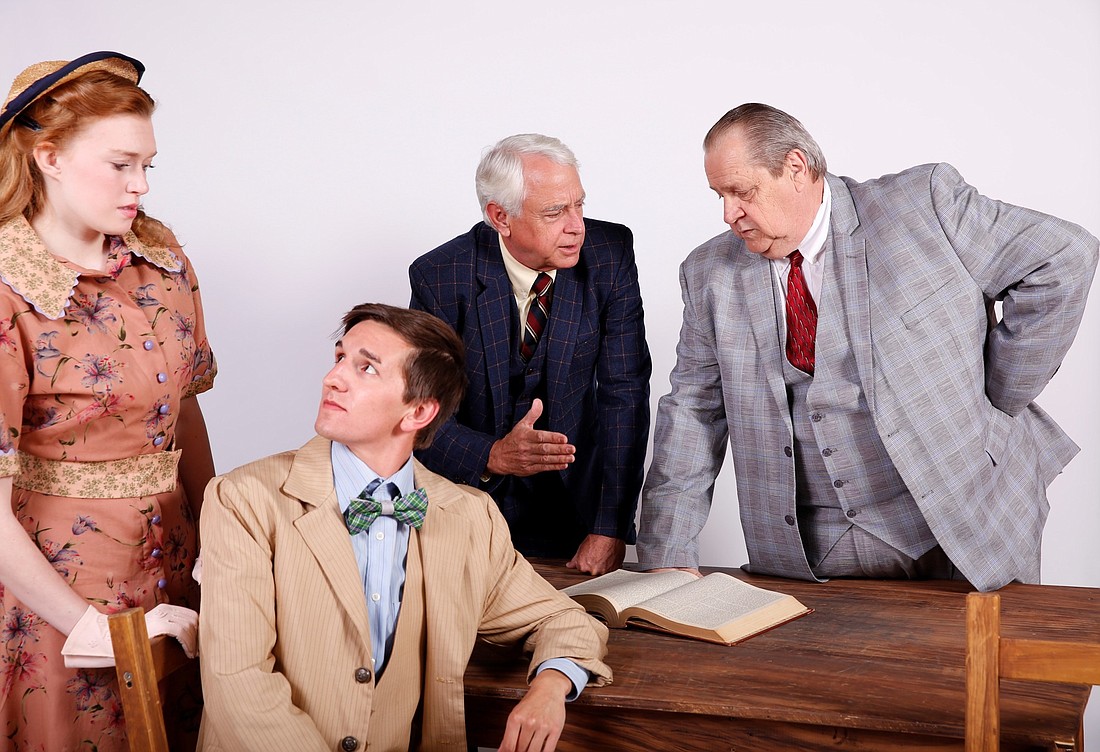- April 28, 2024
-
-
Loading

Loading

Jerome Lawrence and Robert E. Lee’s “Inherit the Wind” investigates the collision of bad law and good science at Venice Theatre. It’s still, unfortunately, just as timely as ever.
The play is a fictionalized account of the 1925 Scopes “Monkey” Trial, of a teacher who was put on trial after he defied Tennessee’s laws against teaching evolution in its public schools.
The play’s depiction of small-town life in the early 20th century America is straight out of a Ray Bradbury science fiction story. Tim Wisgerhof’s surreal, three-tiered set is (if you’ll pardon the pun) a monkey gym adorned with a combination of Americana and religious slogans. It’s a perfect setting for a carnival of homespun horrors Bradbury would know all too well.
Matt Sawalski’s schoolteacher (the Snopes stand-in) is a meek sacrificial lamb, laying down his life in the name of science. His girlfriend (Julie King) can’t wrap her mind around his defiance of groupthink consensus. Her father (Neil Kasanofsky) is the not-so-meek town preacher—who’s perfectly willing to sacrifice the teacher in the name of his brand of religion. The wisecracking Chicago reporter (a sneering stand-in for H.L Mencken, in a deft comic performance by Jeremy Guerrero) regards the show trial with amused contempt.
The outcome is never in doubt. Matthew Harrison Brady (a stand-in for Williams Jennings Bryan) is the prosecuting attorney. Murray Chase plays him as a blustering bloviator. Brady’s been the darling of small town America for so long, he takes it for granted—and he hasn’t really done his homework. Brady’s legal arguments are weak; he figures his Bible-based emotional arguments will win. Actually, they do. But it’s a hollow victory. Brady successfully gets the judge to exclude any expert scientific testimony—which would’ve allowed the defense attorney, Henry Drummond (a stand-in for Clarence Darrow), to put the law on trial.
In Preston Boyd’s pugilistic portrayal, Drummond responds by fighting dirty. He calls the overconfident Brady as an expert witness—and effectively puts him on trial. Drummond makes his opponent look like a ridiculous, self-important, self-appointed prophet—and turns Brady into a laughing stock. Big-city America takes his microphone away. Small-town America turns on him—and it literally breaks his heart. The teacher gets a token fine.
I remember the chill that ran up my spine when I first watched the crowd singing “That Old Time Religion” with mindless fervor in the 1960 movie. In retrospect, I was watching a parade of small-town straw-men. The movie was setting them up as a bunch of dumb hicks that clever rationalists could easily knock down.
Kelly Woodland’s direction takes it down a notch. Individually, the play’s characters aren’t ignorant hayseeds. It’s only when they form a mob that their collective IQ plummets.
So, has America evolved since 1925?
It depends on how you look at it.
The play’s depiction of small-minded, small-town life is largely a thing of the past. But the more things change, the more they don’t. The internet has spawned a new, mutant form of small-minded, self-contained communities. From flat-earthers to fascists, these 21st century true-believers spawn and multiply in their online echo chambers. The popular delusions and the madness of crowds are still alive and well.
Sadly, this play is not old news.